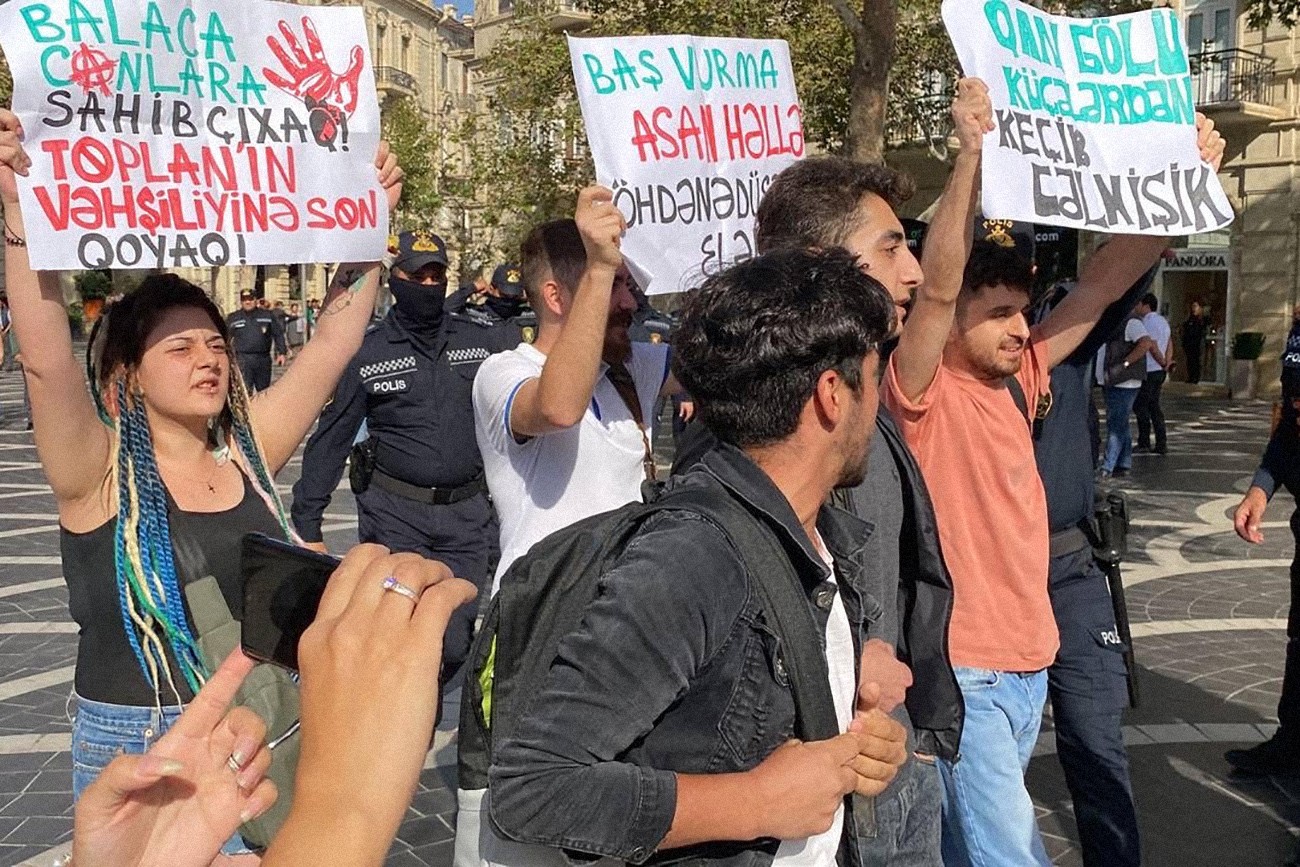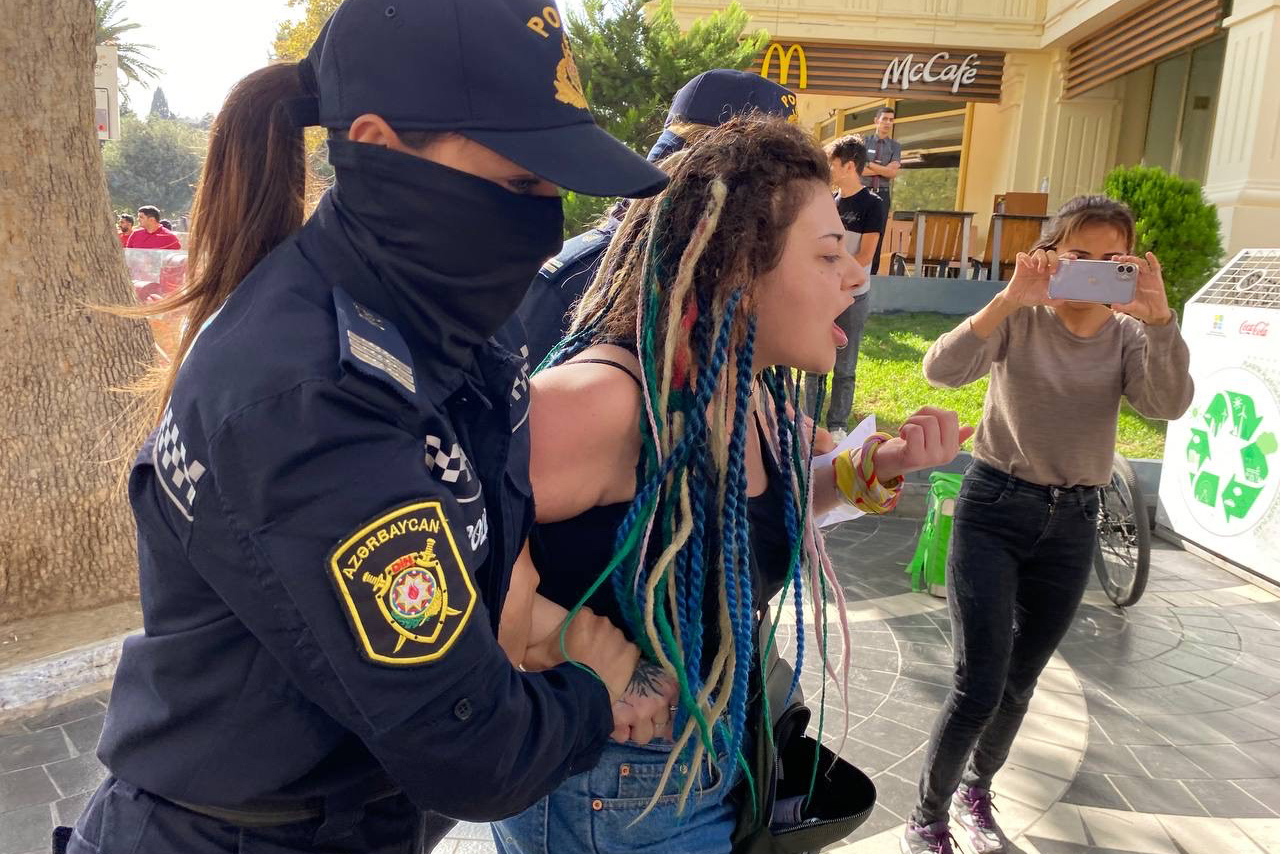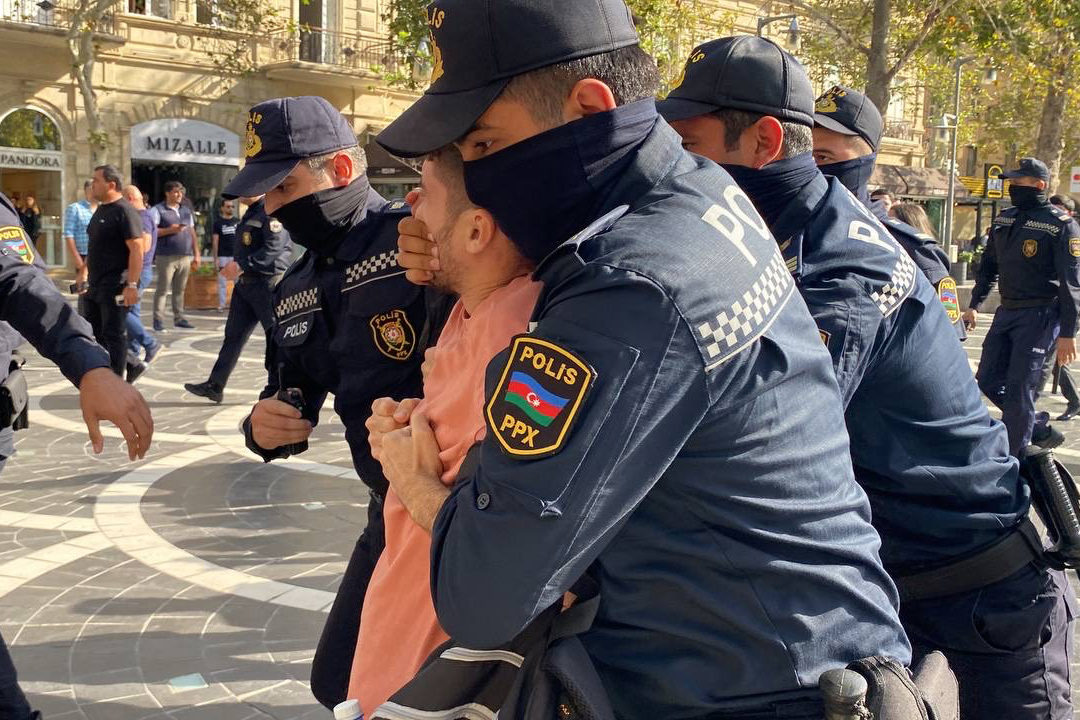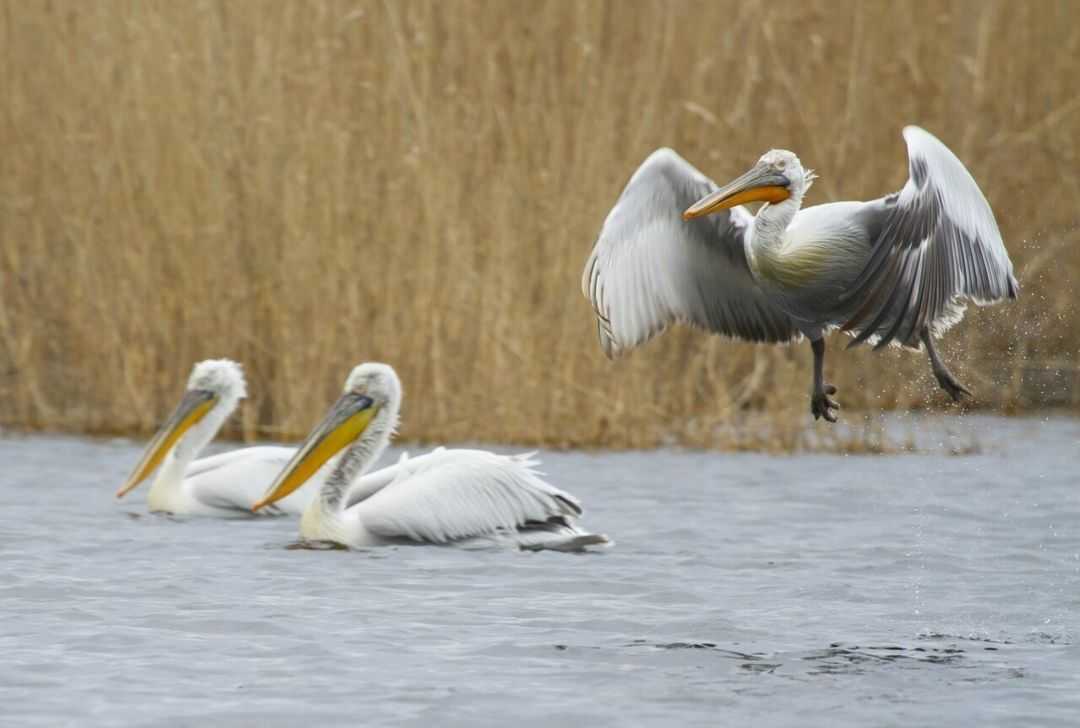
In Azerbaijan, animal rights activists have been protesting the illegal shooting of dogs by municipal authorities, but are doing so in the face of legal challenges and police brutality.
‘We often see blood on the streets,’ says Kamran Mammadli, a 27-year-old vegan activist.
Mammadli has been engaged in animal rights activism since the movement began to gain momentum in Azerbaijan, around four years ago. He tells OC Media that state violence against stray dogs played a driving role in the movement’s formation, but that activists often experience that violence themselves.
The blood is evidence that, contrary to state assurances that stray dogs in Baku are captured so they can be sterilised and released, they are in fact being taken to the outskirts of the city and shot.
The activists’ claims are focused on the Toplan Animal Care Centre — an institution established in 2018 by the Heydar Aliyev Foundation, whose stated aim is to ‘ensure the safety of [Baku’s] residents, take care of stray animals, and change society’s attitudes towards them’.
But activists claim that dogs have, instead, been going missing.
‘The fact is that dogs disappear. Toplan workers take dogs from the streets in a very cruel, unethical manner, violating the well-being of the dogs. The workers beat the dogs and some dogs’ mouths are bleeding, and some are injured, and they take them away without caring about that. We also have videos showing this,’ says Nijat Ismayil, another animal rights activist.
‘A torturous method of killing’
Activists say that the Toplan centre collects dogs from the centre of Baku every day. They are then taken to places outside the centre of Baku — the city’s outskirts, but also regions further out from the city — and employees of state institutions and municipalities shoot and kill the dogs on the streets.
[Read more on OC Media: Baku police disperse protest against ‘systematic killing’ of stray dogs]
Mammadli says that there’s a logic to this process. If dogs were shot in the centre of Baku, people would take videos and publicise them. Shooting dogs in less populous areas allows the authorities to keep this activity hidden from public view, even if videos do still sometimes make it to social media.
Mammadli says that the dogs often suffer a slow and painful death.
‘This is a torturous method of killing. In many cases, shot dogs die after a day of suffering.’
He adds that the practice is not just cruel, it’s also illegal, according to both Azerbaijan’s legislation and the European Convention for the Protection of Pet Animals, to which Azerbaijan is a signatory.
Further, the use of weapons is itself against the law. In Azerbaijan, only law enforcement officers are allowed to bear arms, so municipal authorities acquiring and using guns is illegal.
Videos of dogs being shot are often circulated on social networks. Activists say that they have been able to publicise some of the shootings sufficiently widely that the Ministry of Internal Affairs has been forced to respond, publishing statements claiming that the people responsible for the incidents have been held accountable.
Neither the Heydar Aliyev Foundation nor the head of its public relations department responded to OC Media when contacted for comment.
Defending animal rights, risking their own
In defending the rights of animals, activists put themselves at significant risk.
Azerbaijani animal rights activists report that, while all their activism is peaceful and falls within the country’s legislation, they face pressure and violence from the state.
All protests by animal rights activists are prevented or broken up by the police. Activists are often detained, and following their release they report to media that they faced violence and threats from police.


‘The police generally treat us as enemies. It’s as if they’ve been instructed to shout first when animal rights activists arrive, then twist their arms. Once in the police station, they twisted my arm intending to break it very badly. Suddenly, I fell on my knees and started screaming’, says Ismayil.
He adds that, on another occasion, he was strangled while being held at a police station, and could not eat for three days.
Mammadli has similar stories.
‘There were many cases where I was physically assaulted while being taken to the police station, as well as at the station, and suffered injuries’, he says.
‘When we hold protests, they violently arrest us and take us to police stations. We are also punished with baseless fines.’
Following a protest in July 2021, the activists were fined ₼2,400 ($1,400), which included a fine of ₼600 ($350) for each of the six people detained at the protest.
In August 2021, two employees of the Toplan Animal Care Centre filed a lawsuit against four protesters who had taken part in protests against the centre. Ismayilov was one of the four accused, alongside Elkhan Mirzayev, Aynur Babazade, and Ilhama Nasirova.
The employees alleged that they had been defamed, their public reputations had been damaged, and they had been publicly humiliated. Activists consider these claims baseless, and believe that this case was opened against them by the authorities seeking another way to exert pressure on them.
‘This court case case has been artificially prolonged — it has been going on for a year now. The employees of the Toplan Centre require us to pay ₼100,000 ($59,000) as compensation. If the verdict of the court is not as we want, we will take the case to the European Court of Human Rights,’ says Ismayil.
Hope for the future
Mammadli says that the issue of animal rights is closely tied to broader political repression.
He says that because the state is anti-democratic, the activists have very little power to influence the actions of the authorities and stop animal rights abuses by the Toplan Centre.
‘As long as there is no transition to democratic governance in Azerbaijan… the process of fulfilling our demands will be slow,’ he says. ‘For this reason, democratic changes are our parallel demand.’
Mammadli believes that their demand for government reform is one of the reasons why the state is so keen to quash any animal rights activism.
‘For years, the state has made Azerbaijani society such that people cannot think about anything other than their daily personal interests and cannot have any public opinions. For this reason, protestors raising their voices for animals is even more shocking for them. It is opposite to the social structure they have been building for years.’
‘Moreover, the emergence of a new protest force exposing the state’s crimes in the country worries the authorities. We see them clearly,’ says Mammadli.
According to him, the issues of animal rights and human rights are closely tied, with many animal rights activists also campaigning for other causes, such as queer rights and for victims of political oppression.
‘I also think that changes in people’s attitudes towards animals will significantly change the people of Azerbaijan.’
Mammadli is now working on building a vegan activist team in Azerbaijan, and his fellow activists run animal rights campaigns on social media, alongside their ongoing campaigning against Toplan.
Despite the pressure and obstacles the activists face in Azerbaijan, Kamran remains hopeful.
‘I think, no matter how difficult it is, we should be able to overcome them,’ he says.








